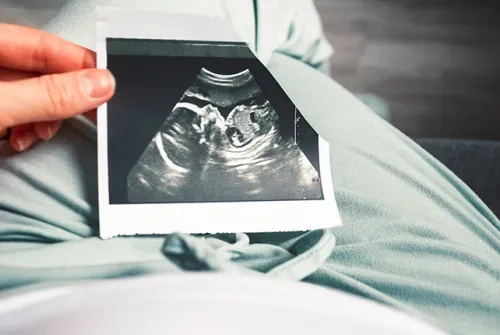Alo Yeditepe
Alo Yeditepe
What Happens at 7 Weeks of Pregnancy?
Week 7 is next in our week-by-week pregnancy series... So, how big is the baby in the 7th week of pregnancy? How will it look? What changes will occur in the mother?
Head of the Department of Obstetrics and Gynecology at Yeditepe University Hospitals and IVF Specialist Prof. Dr. Erkut Attar explained what happened in the 7th week of pregnancy.
What Does the Baby Look Like at 7 Weeks of Pregnancy?
In the 7th week of pregnancy, your baby is the size of a chickpea. Cartilage tissue is forming in your baby's arms this week, along with nerves. The arm buds that sprouted last week are lengthening and the shoulders, upper arms, and forearms are becoming more open. The hands are still more like flattened paddles than fingered palms. Lower limb buds are emerging that will later form legs. The legs and feet will go through the same development as the arms and hands in just a few days.
By the 7th week of pregnancy, the baby is about the size of a bean.
Baby in the Membranous Sac
Your baby's spinal cord and brain are developing; its brain is growing so fast that it is bigger than its body at this time of the week. Your baby is in a membranous sac and is supported by fluid known as amniotic fluid. Nostrils and lips are now visible on your baby's face and eyes can be seen under the skin. The inner ear is beginning to develop, although the outer ear is not yet visible. The eyes are still in the early stages of development, but small eyelids are beginning to form from translucent folds.
From the 7th week of pregnancy, your baby's liver produces red blood cells until the bone marrow grows and takes over this role.
A loop in its growing intestines is bulging into the umbilical cord. The cord now has different blood vessels ready to carry oxygen and nutrients to the tiny body and remove waste materials such as carbon dioxide from the fetus.
Your Uterus is the Size of a Lemon
Your uterus has reached the size of a lemon, it is located just behind the bladder, so you may start to experience symptoms of frequent urination. Fatigue and a tendency to sleep may continue to increase.
Reflux May Start During Pregnancy
Reflux, which is quite common in pregnancy, may start as of this week, and nausea will continue until around 12-14 weeks. For this reason, you should avoid large meals and eat small meals. You may feel uncomfortable when you leave your stomach completely empty, so it is useful to have snacks at hand.
Cravings and Salivation During Pregnancy
Although cravings are very popular when it comes to food during pregnancy, it is actually quite common to develop an aversion to certain foods. Do not let this bother you; however, if you develop an aversion to meat or chicken, for example, you can replace it with a different protein source in consultation with your doctor or dietitian. Increased salivation, which will continue until the end of the first trimester, may also bother you this week, chewing sugar-free gum will reduce your discomfort.
Image of a 5-7 Weeks-Old Baby
1 Question | 1 Answer about Pregnancy
Is it safe to lift heavy weights and hold a small child during pregnancy?
Lifting heavy objects is also something to keep in mind as it increases the mother's energy requirements. Carrying a load of more than 3 kilos at a time, doing bazaar shopping, or lifting a small child can affect the mother.
About
Faculty and Year of Graduation:
Istanbul University, Cerrahpasa Medical School 1986
”
See Also
- Contraceptive Methods: Birth Control and Effective Protection Options
- Genetic Diagnosis in IVF Treatment
- What Happens at 3rd Weeks of Pregnancy?
- What Happens at 2nd Week of Pregnancy?
- What is Endometriosis? What are the Symptoms of Endometriosis?
- What is Pelvic Floor? What are Their Duties?
- The Most Common Diseases in Women
- What is Hysteroscopy? Hysteroscopy Usage Areas
- Early Menopause and Ovarian Failure Can Be Prevented
- Polycystic Ovary Syndrome and its Treatment
- Electromagnetic Stimulation in the Treatment of Endometriosis and Infertility
- Causes of Female Infertility
- Chronic Pelvic Pain
- What is Polycystic Ovary Syndrome/PCOS?
- Postpartum Period
- The Chance of Becoming a Father Increases with Microchip Technology
- Thanks to the Ovarian Rejuvenation Method, She Counts the Days for Birth!
- Some Patients Go Through Menopause Even at the Age of 15
- Useful Bacteria Increases IVF Success
- Polycystic Ovary Syndrome Can Occur If the Bacteria in the Gut Are Not Functioning Well
- Imaging Methods During Pregnancy
- After 16 Years, She Wanted to Be a Mother Again; She Experienced the Shock of Her Life
- These Diseases Affect Women Differently Than Men
- Beware of Chocolate Cyst! It Affects 1 in 10 Women
- Causes of Male Factor Infertility
- The Effect of Advanced Age on IVF Treatment
- Infertility
- Polycystic Ovary Syndrome
- Early Menopause
- Blocked Fallopian Tube
- Vaginismus
- Low Ovarian Reserve (AMH)
- Which Methods Increase Success in Treatment of Infertility?
- Intrauterine insemination (IUI)
- Microinjection
- Egg Cryopreservation
- Assisted Hatching
- Micro-chip
- Pre-implantation Genetic Diagnosis
- Endometriosis
- Co-Culture
- Ovarian Rejuvenation / PRP
- This Problem Ruins the Lives of One in Every 10 Women
- Prof. Dr. Attar: Endometriosis Can Be Associated With Some Chronic Diseases
- What Happens at 38 Weeks of Pregnancy?
- What Happens at 37 Weeks of Pregnancy?
- What Happens at 36 Weeks of Pregnancy?
- What Happens at 35 Weeks of Pregnancy?
- What Happens at 34 Weeks of Pregnancy?
- What Happens at 33 Weeks of Pregnancy?
- What Happens at 32 Weeks of Pregnancy?
- What Happens at 31 Weeks of Pregnancy?
- What Happens at 30 Weeks of Pregnancy?
- What Happens at 29 Weeks of Pregnancy?
- What Happens at 28 Weeks of Pregnancy?
- What Happens at 27 Weeks of Pregnancy?
- What Happens at 26 Weeks of Pregnancy?
- What Happens at 25 Weeks of Pregnancy?
- What Happens at 24 Weeks of Pregnancy?
- What Happens at 23 Weeks of Pregnancy?
- What Happens at 22 Weeks of Pregnancy?
- What Happens at 21 Weeks of Pregnancy?
- What Happens at 20 Weeks of Pregnancy?
- What Happens at 19 Weeks of Pregnancy?
- What Happens at 18 Weeks of Pregnancy?
- What Happens at 17 Weeks of Pregnancy?
- What Happens at 16 Weeks of Pregnancy?
- What Happens at 15 Weeks of Pregnancy?
- What Happens at 14 Weeks of Pregnancy?
- What Happens at 13 Weeks of Pregnancy?
- What Happens at 12 Weeks of Pregnancy?
- What Happens at 11 Weeks of Pregnancy?
- What Happens at 10 Weeks of Pregnancy?
- What Happens at 9 Weeks of Pregnancy?
- What Happens at 8 Weeks of Pregnancy?
- What Happens at 6 Weeks of Pregnancy?
- What Happens at 5 Weeks of Pregnancy?
- What Happens at 4 Weeks of Pregnancy?
- What Happens at 1st. Weeks of Pregnancy?
- Considerations for Embryo Transfer
- What Causes Menstrual Irregularity, How Is It Treated?
- Success in IVF after 43 Decreases to Five Percent
- Does Pregnant Coronaviruses Affect?
- Most Frequently Asked Questions During Pregnancy
- 1 in 10 Women Have This Problem; It Can Lead To Infertility
- Effective Results Can Be Achieved with PRP in Women with Low Egg Count
Alo Yeditepe




